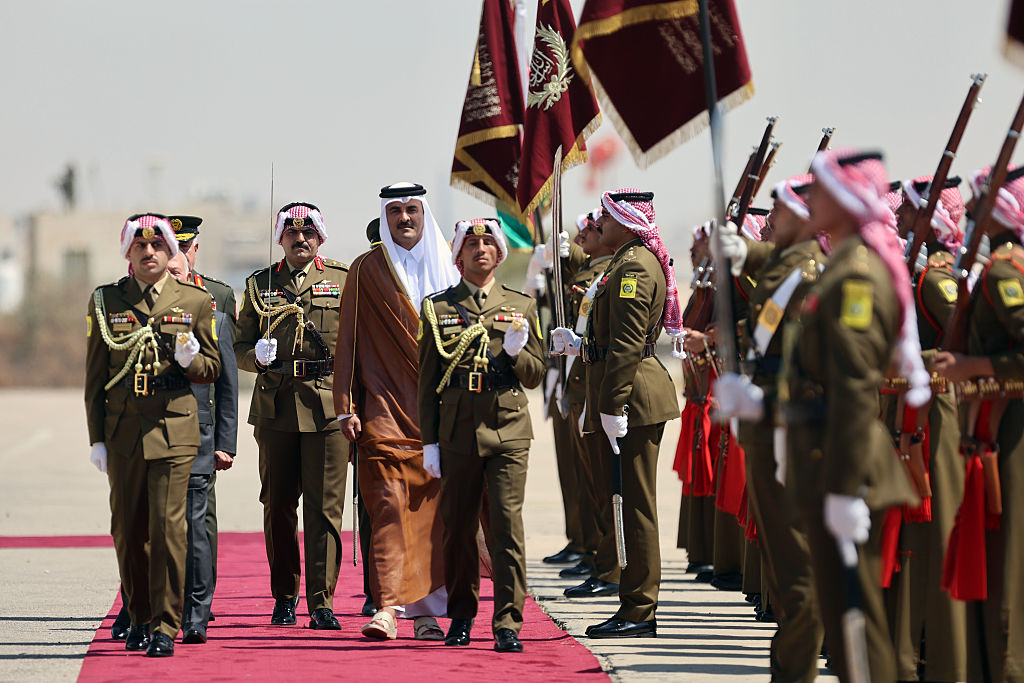In a bold push for regional security, some Muslim world leaders are calling for the establishment of an Arab or Islamic NATO. The idea sparks intense debate in the region and beyond
On 15th September, leaders from across the Arab and Islamic world gathered in Qatar for an emergency summit. What started as a meeting to condemn an Israeli airstrike on Qatar’s capital Doha pivoted to talks about an Arab or Islamic NATO — a military alliance aimed at protecting Arab and Muslim nations from threats such as the one Qatar faced on 9th September. Qatar, which has hosted Hamas’ political office since 2012, saw the Israeli airstrikes as a violation of its sovereignty. Remember, Qatar is a close U.S. ally; it hosts the largest U.S. airbase in West Asia.
Qatar did not waste time in calling an emergency Arab — Islamic summit. It brought together the members of the Arab League and the Organisation of Islamic Cooperation — more than 40 countries in all. Hosted by Qatar’s Emir Sheikh Tamim bin Hamad Al Thani, the summit kicked off with a show of unity. The leaders posed for family photographs. Egypt’s President Abdel Fattah el-Sisi, Turkiye’s President Recep Tayyip Erdogan, Saudi Arabia’s Crown Prince and Prime Minister Mohammad bin Salman and Iran’s President Masoud Pezeshkian were in attendance.
A joint communique issued towards the end of the summit slammed Israel for undermining peace efforts in Gaza. It did not explicitly call for an Arab or Islamic NATO but the leaders of Egypt, Iran and Pakistan, among others, spoke about pooling their resources to create a shield in order to protect the interests of the countries in the region. Egypt wants an Arab NATO but Iran is pushing for a more Islamic version. President el-Sisi of Egypt, which has the biggest army in the Arab world, proposed reviving a NATO-style collective defence pact. By implication, an attack against one Arab or Islamic country constitutes aggression against all Arab and Islamic States — similar to Article 5 of NATO. He even offered to contribute 20,000 Egyptian troops right away, with potential involvement from other countries.
The idea of an Arab NATO is not new. It’s been floating around for years, especially since Saudi Arabia launched a 34-nation Islamic military alliance against terrorism back in 2015, right after the Arab Spring. A similar proposal was mooted in 2022, one which included Israel; not Iran. Benny Gantz, Israel’s defence minister at the time, said that Israel had joined a new U.S.-led network that he called the Middle East Air Defence Alliance. Jordan’s King Abdullah — The Second has spoken about it, too. It was argued at the time that Arab nations who fear aerial attack from Iran or Iranian proxies would like to share in Israel’s sophisticated air defence capabilities. Also, it would be a perfect segue to the improved contacts between Israel and its Arab neighbours that began with the Abraham Accords. The Abraham Accords normalised Israel’s ties with the United Arab Emirates, Bahrain, Sudan and Morocco. Efforts were made to normalise Israel’s relations with Saudi Arabia but they were not pursued after the Gaza conflict erupted, with Saudi Arabia calling for first creating a viable path to an independent Palestinian state. So the idea of an Arab NATO has been put forward many times in the past but it has never crystallised.
The Qatar summit ended with strong words but no binding commitments yet — just vague pledges and symbolism. Which begs the question: Are the region’s leaders serious about a NATO-like force or is it just another attempt at paying lip-service to the Arab cause? Do the Arab States really have it in them to take on Israel? And then again, does the idea of an Arab NATO militate against the Abraham Accords? Already, countries such as the U.A.E. and Bahrain that signed the Abraham Accords with Israel are threatening to pull out if Israel keeps expanding in the West Bank or attacking neutral states such as Qatar. A U.S.-based news website Axios reported that the Emiratis have made clear in private and in public that they see annexation of parts of the West Bank as a red line. There’s also a lot at stake for countries such as India, which enjoys strong ties with Israel and the Gulf states. One of the reasons for it is that it’s not just Arab countries that are calling for a joint military force. Pakistan’s Prime Minister Sharif has joined in the chorus, too — the implications of which for India’s interests are not too far to seek.














